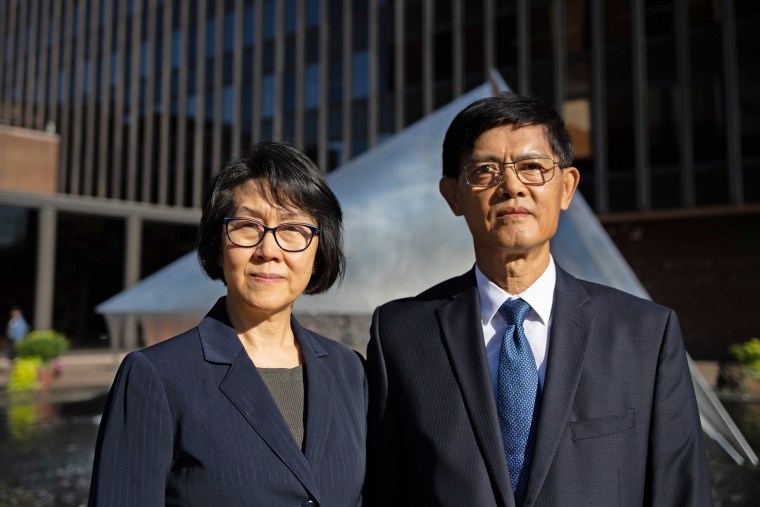Xiaoxing Xi, a Temple University professor who was falsely accused of spying for China, will be able to bring a lawsuit against the Federal Bureau of Investigation.
A judge at a federal appeals court ruled in favor of Xi on Wednesday, allowing the physicist to move forward with his case against the U.S. government for wrongful prosecution and violating his family’s constitutional rights by engaging in unlawful search, seizure and surveillance.
The decision comes after FBI agents swarmed Xi’s Philadelphia home in 2015, rounded up his family at gunpoint, and arrested him on fraud charges related to economic espionage, before abruptly dropping the charges months afterward.
“I’m very, very glad that we can finally put the government under oath to explain why they decided to do what they did, violating our constitutional rights,” Xi said in an exclusive interview with NBC News. “We finally have an opportunity to hold them accountable.”
The case will now be kicked back to the district court, continuing a long legal battle. Xi, who’s represented in part by the American Civil Liberties Union, attempted to bring a suit against the government in 2017, alleging that FBI agents “made knowingly or recklessly false statements” to support their investigation and prosecution. Xi also claimed that his arrest was discriminatory, and that he was targeted due to his ethnicity, much like other scholars of Chinese descent. A district court dismissed his case in 2021, but Xi appealed the decision last year.
The Federal Bureau of Investigation declined to comment.
The espionage case against Xi pertained to his alleged disclosure of manufacturing information with his research community. The Justice Department in 2015 had accused the physicist of sharing schematics for a pocket heater, for which Xi had previously signed a nondisclosure agreement, with peers in China. Testimony from fellow physicists, however, showed the blueprints weren’t for the technology in question, but for Xi’s own invention. And court documents showed that the inventor of the pocket heater had told the lead FBI agent on the case that the technology was “widely known” and not “revolutionary.”
The case collapsed four months after Xi’s arrest, but not before the professor was threatened with up to 80 years in prison and a fine of up to $1 million.
With the recent decision, Xi said he hopes more Asian Americans will become more activated and hold those in power accountable.
“For Chinese, it used to be that people try to keep quiet and just move on with their life and just don’t do anything, don’t say anything. But now I can see that more and more people are willing to speak up,” Xi said. “I hope what I have been doing has, in some way, encouraged people to do that and of course take legal action against the government — that’s another big step on top of speaking up.”
The legal battles have come at a cost, however. Xi explained it took a toll on him mentally, emotionally and on his research.
“The big part is this fear. Having gone through the process, knowing what the government could do to twist nothing into a reason to charge you — That’s just a very significant psychological impact,” he said. “Everything I do, I’ve become extra extra careful.”
Citing scientists like MIT’s Gang Chen, who was similarly cleared after a DOJ investigation but now refuses to do federally funded research, Xi said that the string of Asian American scientists who have been wrongly accused has created a tense research environment. The conversation around racial profiling of Asian American scholars had also intensified after the “China Initiative,” a Trump-era security program aimed at addressing Chinese economic espionage, but prompting many false accusations and lives thrown into disarray.
Last year, the Biden administration sunsetted the policy, but Xi said many are still uneasy. According to research by the Committee of 100, more than 50% of scientists of Chinese descent in the U.S. “feel considerable fear and/or anxiety” that they are under government surveillance.
“As a scientist, you’re facing a lot of risks. Do people really want to take those risks?” he said. “All this has a very negative impact on the scientific community, in particular for Chinese scientists, and it will have a very negative impact on American science.”
Xi also said that the government “should not go without any consequence” for what he and his family have had to shoulder.
“That was a very traumatic event, not only to me but it was also a very traumatic event to my family. My two daughters, my wife — everyone reacts to this in their different ways,” Xi said through tears. “We try to go on with our lives, but it’s there.”
